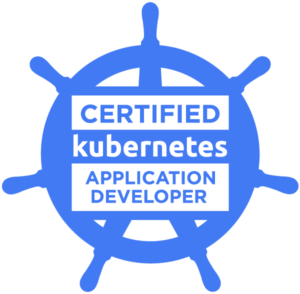For a Devops specialist or software developer, having knowledge in Cloud native environments is an important success in your career. Having knowledge in environments such as Kubernetes will provide you with knowledge of how your applications will behave not only in the development environment, but also in live environments. The most important area where a devops expert should keep himself up to date is container technologies, but it is very important for today’s requirements that not only devops experts but also software developers have knowledge about these environments and make their developments according to these environments. In this blog, you will be given useful information on the process of obtaining the CKAD certification, which is the entry level to Kubernetes, and tips to help you pass the exam successfully.

CKAD is an exam that consists of scenario-based questions and measures your ability to design, build and deploy cloud native applications. The exam topics are as follows and you need to understand the basic logic of these topics well and then solve as many practical questions as possible because the exam questions are not actually that difficult, you can easily solve these questions in one day by searching on the internet, but the CKAD is an exam where you compete against time.
Study Core Concepts
Application Design and Build
Application Deployment
Application Observability and Maintenance
Application Environment, Configuration and Security
Services and Networking
Kubernetes documentation (https://kubernetes.io/docs/home/) and blog (https://kubernetes.io/blog/) pages are quite sufficient for you to learn these topics. You can study the basics from the Kubernetes official site. However, sometimes video lessons can be useful in the learning process and can speed up the process. A few udemy and youtube courses will help you understand the basic concept of kubernetes.
https://www.udemy.com/course/certified-kubernetes-application-developer/?couponCode=LETSLEARNNOW
https://www.youtube.com/watch?v=X48VuDVv0do
Practice Exam Questions
After studying the basic topics, it will be in your best interest to solve as many practical questions as possible until the exam date. Although the exam is not a very difficult exam, you need to solve 16-18 questions in only two hours of exam time. These questions will be at the easy-medium-difficult level and the score for each question may differ depending on the difficulty level. Therefore, in order to understand and solve easy and medium questions quickly, you need to be able to get used to some commands without thinking or searching in the documentation. Of course, you can benefit from the kubernetes.io documentation page during the exam , but the time you spend on documentation to create a simple nginx deployment will be to your detriment.
You can work on the following scenario questions in your kubernetes environment. I solved these questions over and over again 2-3 times, and whenever I could answer the question as soon as I saw it, without looking for it in the documentation, I felt ready and set the exam date.
https://github.com/bmuschko/ckad-crash-course/tree/master/exercises
https://github.com/dgkanatsios/CKAD-exercises
Exam Day
I recommend that you read the candidate handbook carefully (https://docs.linuxfoundation.org/tc-docs/certification/lf-handbook2) before the exam day. The exam session starts half an hour before the exam time and you can start preparing for the exam. In preparation for the exam, you are required to present an official ID and your exam environment to the instructor with a camera. There shouldn’t be any phones or books on your desk. You can warn your household to silence suring the exam time and your phone, keep it away from the environment, and not disturb you from outside.
When the necessary checks are completed, the instructor will start your exam. It is not a problem that the checks may take a long time, even if the exam time is late, the instructor will start the two-hour period after the end time of the checks. When your exam starts, you can start with easy and medium level questions first and save yourself time for difficult questions. If you encounter a difficult question and do not fully understand it, do not waste more than 3 minutes and move on to other questions. With this tactic, you will have plenty of time at the end of the exam and you can look back at difficult questions or unfinished questions and solve them later.
At the end of the two-hour exam, the instructor will finish the exam and you will receive an e-mail informing you that the results will be notified within 24 hours. You can see the exam result after 24 hours. The questions are not shared as a result of the exam and you cannot see the questions you made mistakes. However, make a note of the topics you are stuck on during the exam and you can research those topics after the exam. If you fail the exam, you have the right to take 1 retake. I recommend that you study the questions that you could not answer while your knowledge is still fresh and take the exam again as soon as possible. Procrastination may lead to difficulties recalling the questions that were previously challenging, potentially hindering performance in the retake. Therefore, proactive preparation and timely retake scheduling are crucial strategies for maximizing learning outcomes in this exam scenario
Finally, I wish success to those who will take the CKAD exam. I hope everyone achieves the results they want and you can reach the places you want in your career. CKAD is not a very difficult exam, you just need to gain the skills to solve the questions in a limited time. Solving the exam exercises I shared above with a timer will be useful for time management.
Good luck everyone!
